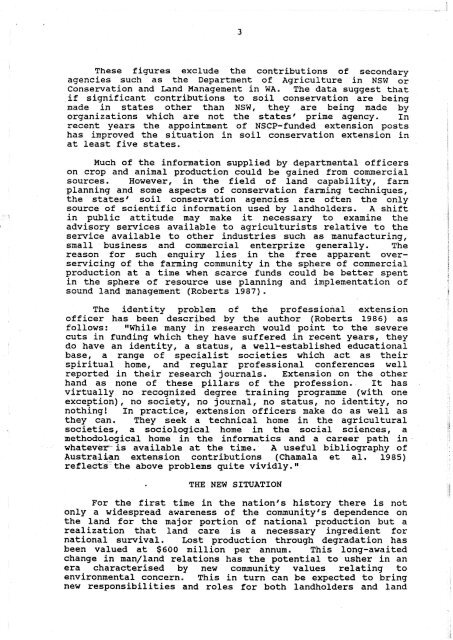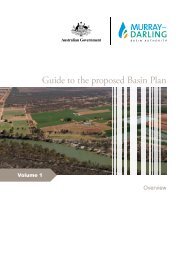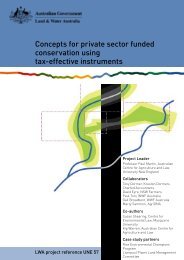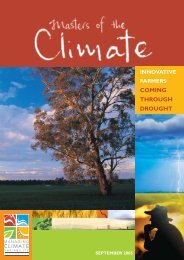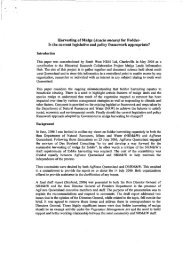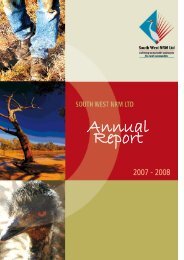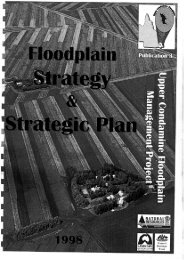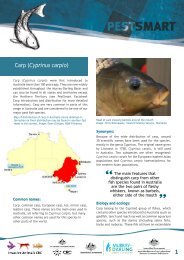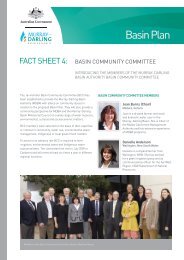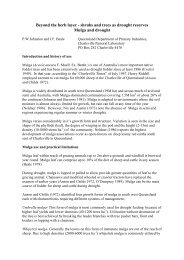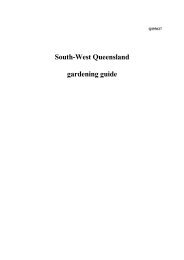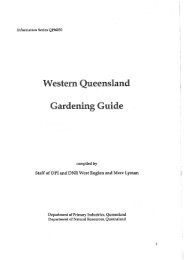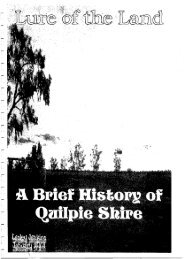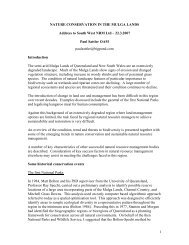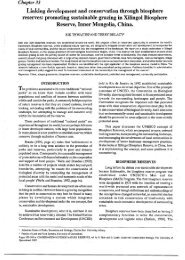soil-conservation-people-religion-and-land.pdf - South West NRM
soil-conservation-people-religion-and-land.pdf - South West NRM
soil-conservation-people-religion-and-land.pdf - South West NRM
You also want an ePaper? Increase the reach of your titles
YUMPU automatically turns print PDFs into web optimized ePapers that Google loves.
These figures exclude the contributions of secondary<br />
agencies such as the Department of Agriculture in NSW or<br />
<strong>conservation</strong> <strong>and</strong> L<strong>and</strong> Management in WA. The data suggest that<br />
if significant contributions to <strong>soil</strong> <strong>conservation</strong> are being<br />
made in states other than NSW, they are being made by<br />
organizations which are not the states' prime agency. In<br />
recent years the appointment of NSCP-funded extension posts<br />
has improved the situation in <strong>soil</strong> <strong>conservation</strong> extension in<br />
at least five states.<br />
Much of the information supplied by departmental officers<br />
on crop <strong>and</strong> animal production could be gained from commercial<br />
sources. However, in the field of l<strong>and</strong> capability, farm<br />
planning <strong>and</strong> some aspects of consenration farming techniques,<br />
the states' <strong>soil</strong> <strong>conservation</strong> agencies are often the only<br />
source of scientific information used by l<strong>and</strong>holders. A shift<br />
in public attitude may make it necessary to examine the<br />
advisory services available to agriculturists relative to the<br />
service available to other industries such as manufacturing,<br />
small business <strong>and</strong> commercial enterprize generally. The<br />
reason for such enquiry lies in the free apparent overservicing<br />
of the farming community in the sphere of commercial<br />
production at a time when scarce funds could be better spent<br />
in the sphere of resource use planning <strong>and</strong> implementation of<br />
sound l<strong>and</strong> management (Roberts 1987).<br />
The identity problem of the professional extension<br />
officer has been described by the author (Roberts 1986) as<br />
follows: "While many in research would point to the severe<br />
cuts in funding which they have suffered in recent years, they<br />
do have an identity, a status, a well-established educational<br />
base, a range of specialist societies which act as their<br />
spiritual home, <strong>and</strong> regular professional conferences well<br />
reported in their research journals. Extension on the other<br />
h<strong>and</strong> as none of these pillars of the profession. It has<br />
virtually no recognized degree training programme (with one<br />
exception) , no society, no journal, no status, no identity, no<br />
nothing! In practice, extension officers make do as well as<br />
they can. They seek a technical home in the agricultural<br />
societies, a sociological home in the social sciences, a<br />
methottol-~gical home in the informatics <strong>and</strong> a career path in<br />
whateve is available at the time. A useful bibliography of<br />
Australian extension contributions (Chamala et al. 1985)<br />
reflects'the above problems quite vividly."<br />
THE NEW SITUATION<br />
For the first time in the nation's history there is not<br />
only a widespread awareness of the community8s dependence on<br />
the l<strong>and</strong> for the major portion of national production but a<br />
realization that l<strong>and</strong> care is a necessary ingredient for<br />
national survival. Lost production through degradation has<br />
been valued at $600 million per annum. This long-awaited<br />
change in man/l<strong>and</strong> relations has the potential to usher in an<br />
era characterised by new community values relating to<br />
environmental concern. This in turn can be expected to bring<br />
new responsibilities <strong>and</strong> roles for both l<strong>and</strong>holders <strong>and</strong> l<strong>and</strong>


